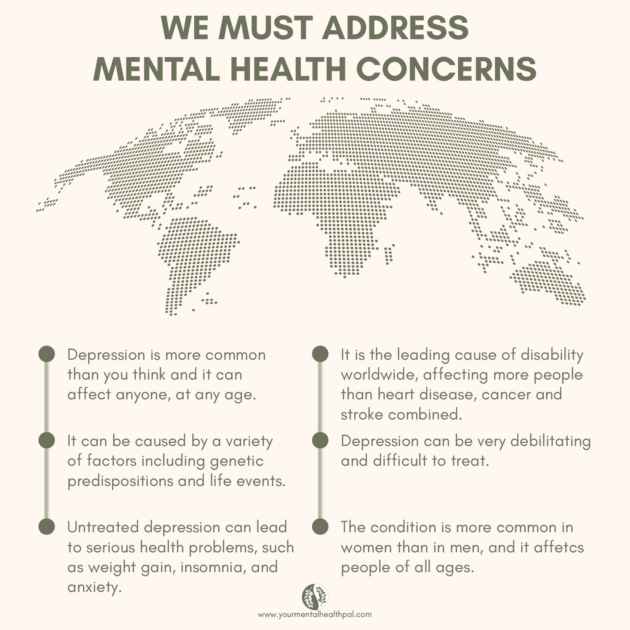Is mental health a global issue? Of the world’s population, people with mental and psychological problems make up a significant percentage. One in four people may, according to estimates, develop a mental health disorder at some point in their lifetime, which affects millions of people worldwide.
The World Health Organization (WHO) recognizes that mental illnesses can seriously affect individuals, families, and communities. But, mental health starts with knowing your mental health and realizing it’s essential to talk about when you need help.
Think about it. Are you having a bad day? If so, why? What is making you angry? How are you feeling? Are these feelings normal, and what do you plan to do to help yourself feel better and healthier?

The Definition of Mental Health
Is Mental Health A Global Issue?
Mental health is a state of well-being in which an individual feels integrated and content with their life. It can be described as the ability to manage emotions, thoughts, and behaviors appropriately. It can be affected by genetic factors and environmental exposures. Mental health services are available to help people who experience symptoms that interfere with their everyday lives.
Mental health conditions can range from relatively minor problems such as stress, headaches, or sadness due to relationship issues to more severe disorders like major depressive disorder (MDD) or bipolar disorder (BD). There is no single cause for any mental health condition. Still, many shared risk factors exist, including adverse childhood experiences (ACEs), trauma exposure, genetics, socioeconomic status, etc.
Mental illness exists on a spectrum – some people may have only mild symptoms while others have more severe ones.

Now that we know the definition of mental health, let us discuss how it is a global issue.
How Exactly is Mental Health a Global Issue?
Mental health is a global issue because it affects everyone in some way or another. This includes people who are experiencing mental health conditions and those who care about them. Mental health issues can affect anyone at any stage of life and can cause significant distress, dysfunction, and even death.
Mental healthcare is not just for the economically deprived and marginalized – it’s for all of us. And yet, there still isn’t enough access to quality mental healthcare services worldwide. This leaves millions of people with no choice but to cope with their condition in ways that may be harmful or even deadly.
The World Health Organization estimates that about one-third of the world’s population suffers from some form of mental illness, which is growing yearly. In addition to human suffering, mental illness also costs businesses a lot in terms of lost productivity and absenteeism.
Thankfully, there are ways to combat and treat mental illnesses at home and at work. At home, ensuring that those you love access quality mental health services is essential. This can include screening for Mental Health Disorders Early Warning Signs (WHODAS), providing support groups or counseling sessions for people with common disorders such as depression or anxiety, and educating family members about signs and symptoms of mood disorders. Workplaces can take similar measures by implementing programs like Employee Assistance Programs (EAPs).
These programs provide:
- psychological counseling,
- stress management training seminars,
- wellness activities, and
- financial assistance for workers who need help managing their emotional well-being on the job.
Now that we’ve explored how mental health can be a global issue let’s look at why people worldwide struggle with their mental health.
Causes Of Poor Mental Health
Many other factors are responsible for worsening one’s mental health:
- prolonged and unresolved traumatic events,
- childhood experiences,
- family issues,
- losing a loved one, and
- excessive use of drugs or alcohol.
These may result in severe troubles and even give rise to mental illness.
Effects Of Poor Mental Health
It’s easy to ignore your health, but if you ignore what your body is telling you, it could end up costing you in the long run.
Chronic stress is directly associated with:
- increased chances of strokes,
- heart attacks,
- insomnia,
- obesity,
- gastrointestinal distress,
- chest pains, etc.
Most people struggle with mental health issues from time to time, whether work-related stress, social or personal relationships, or financial matters.
It should be noted that a person can experience poor mental health and not be diagnosed with any mental illness. Still, paying attention to these issues becomes crucial because it takes no time for anxiety to turn into anxiety disorders.
Symptoms Of Mental Health Issues
The symptoms are easy to detect and include-
- extreme mood swings,
- withdrawal from friends and family,
- delusions,
- paranoia,
- insomnia and significant tiredness, etc.
Grief and stressful intervals don’t necessarily mean mental illness. Still, you might want to check and take care of yourself now and then. Anyone can develop a mental illness if they don’t pay attention to their health for a long time. A person who looks happy and jolly most of the time can also be diagnosed with severe mental illnesses.
How Common Are Mental Health Issues?
Now that we have explored the causes of poor mental health, it’s time to examine how common mental health issues are.
Global statistics by WHO show that more than 1 billion people worldwide, yes, you read that right, i.e., 13% of the world’s population, suffer from various mental issues and illnesses. They struggle with feelings of depression, anxiety, loneliness, and significant distress in their day-to-day life.
About 7,00,000 people die from suicide every year. It’s estimated that at least 20 others have tried to commit suicide for one adult who died.
These figures provide only an estimate, and the prevalence of mental issues among the world population might be much more. Since most cases go unreported, we do not know who might be struggling. Because of the reasons associated with mental illnesses and sometimes shame, people feel like they cannot reach out for help. And again, this means that the number of people experiencing mental illnesses worldwide is far more than the reported figures show.
About 70% of these people do not even receive the necessary care. About 10% of children and adolescents face numerous behavioral disorders, anxiety, depression, development disabilities, and so on, but do not have access to treatments. Suicide is the fourth leading cause of death among 15-19-year-olds. Thus, it is safe to say that Mental Health is a global issue and needs global action.
How Has The Pandemic Worsened The Issue?
Mental Health A Global Issue?
The world’s already grim mental health condition has only compounded since the spread of the novel coronavirus in 2020. The mental health of people worldwide has taken a toll as there has been a dramatic rise in mental problems.
Strict infection control measures, nationwide lockdowns, quarantine, and social distancing have allowed negative emotions, psychological distress, and constant depression among people to grow continuously. It has disrupted economies and caused financial, economic, and psychological consequences.
What Are The Nations Doing to Solve This Issue?
They are keeping in mind the growing cases of mental health issues worldwide. Many countries like the USA and CANADA have recognized mental health as a global issue and started improving infrastructure for their citizens.
Mental Health Day is observed every year on October 10. It aims to mobilize efforts to improve mental health issues and raise awareness. This day is an opportunity for people to talk about mental health freely and acquaint themselves with what needs to be done to improve it and make affordable healthcare available to all. The World Health Organisation (WHO) has prioritized suicide prevention and reduction of suicide mortality and suggested that death by suicide can be preventable.
Conclusion
Now that you’re done reading this post, we hope you took away some new insights into why mental health matters globally and what you can do today to advocate for better outcomes for people suffering from poor mental health.
As the world continues to warm, we are seeing an increase in mental health issues. From climate change-related illness to the daily stress of a rapidly changing world, it seems like everything is conspiring to take a toll on our mental health. To explore the link between mental health and climate change, click here.
To learn more about mental health, subscribe to Your Mental Health Pal.

